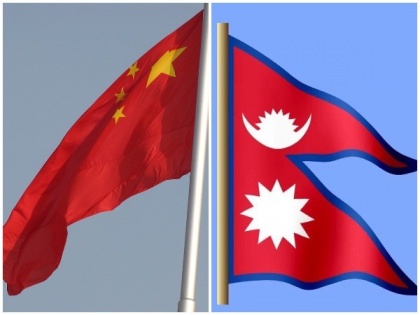Nepal should become a 'demonstration garden', says Chinese Ambassador to Nepal
By ANI | Published: April 15, 2022 03:16 PM2022-04-15T15:16:05+5:302022-04-15T15:25:02+5:30
Chinese ambassador to Nepal, Hou Yanqi (Hou) shared her views on the bilateral cooperation between Beijing and Kathmandu under the China's Belt and Road Initiative (BRI) and said that Nepal should become a "demonstration garden" for friendly cooperation between the two countries, not a "fighting ring" for geopolitical games.

Nepal should become a 'demonstration garden', says Chinese Ambassador to Nepal
Chinese ambassador to Nepal, Hou Yanqi (Hou) shared her views on the bilateral cooperation between Beijing and Kathmandu under the China's Belt and Road Initiative (BRI) and said that Nepal should become a "demonstration garden" for friendly cooperation between the two countries, not a "fighting ring" for geopolitical games.
Responding to the speculation of the Nepal-US Millennium Challenge Compact (MCC) is competing with the BRI, Yanqi said, "Nepal should become a "demonstration garden" for friendly cooperation among countries, not a "fighting ring" for geopolitical games China and Nepal have carried out fruitful cooperation in infrastructure construction covering roads, airports, electric power and water conservancy."
"This is due to the advantages of China, in terms of technology, experience and capital, as well as the fact that China and Nepal are connected by mountains and rivers and geographically adjacent. It is also because the Chinese people are sincere and selfless toward the Nepalese people, supporting the friendship with Nepal without any conditions attached. It can be said that there is no other country that can replace the advantages that China and Nepal have in the BRI cooperation," Yanqi was quoted as saying by Global Times.
Chinese ambassador to Nepal believes that no one can interfere in their relationship and also said that the Nepalis have received benefits from BRI and will continue to receive it.
Yanqi called Nepal, China's good friend and said that the two countries have respected each other's sovereignty and territorial integrity. She further said that both the countries don't interfere in each other's matters, according to Global Times.
Referring to the pandemic situation, Yanqi said, "While the international situation and landscape are rapidly evolving in-depth, and world peace and development are facing new challenges, both China and Nepal are facing the important task of fighting the epidemic and promoting economic and social development."
Yanqi pointed to the Foreign Minister Wang Yi's visit to Kathmandu and said that Yi told Nepal that they will support Nepal to pursue a development path, pursue an independent domestic and foreign policy, and to more deeply participate in the construction of the BRI.
"These three areas of support send a very positive signal to the Nepali side, that is, China's friendly policy is aimed at all parties and people in Nepal in deepening mutually beneficial cooperation and achieving common development," the Chinese Ambassador to Nepal said.
She further added, "Through this visit, the two sides reiterated their respect for each other's national interests and core concerns, and agreed to speed up the joint construction of the Belt and Road and gradually build a Trans-Himalayan Multi-dimensional Connectivity Network, so as to make the Himalayas a bond of friendly cooperation between the two countries, and to promote the development of the two countries cooperation."
While responding to a question on the possibility of the fact that the China-Nepali cross-border railway project was in a 'stagnant state' is true, Yanqi said that the construction of the China-Nepal cross-border railway is an important consensus in the field of connectivity, and it is also the earnest expectation of the two peoples, as per reported by Global Times.
"The railway departments of the two countries have coordinated and communicated with each other many times, completed the pre-feasibility study and other preparations, and made important progress. During Wang's visit to Nepal, the two sides signed the technical assistance plan for the feasibility study project of the China-Nepal cross-border railway project, laying a solid foundation for the next step to promote the project implementation," she said.
Chinese ambassador to Nepal pointed out the achievements of joint construction of projects under the BRI and said that since the signing of the Memorandum of Understanding (MOU) on the BRI cooperation between the two countries in 2017, positive progress has been made in cooperation in various fields such as connectivity, economic and trade investment, infrastructure, and people-to-people cultural exchanges, making important contributions to Nepal's economic and social development, as per reported by Global Times.
She said, "In 2021, the trade volume between China and Nepal reached USD1.98 billion, a year-on-year increase of 67 per cent, of which Nepal's exports to China rose by 63 per cent."
On one hand, Yanqi is stating the BRI's benefit while Nepal has seen a rising discontent and suspicion among the people against Chinese projects and investments in the country, with recent large-scale protests against Belt and Road Initiative (BRI) project in Eastern Nepal's Jhapa district.
China is counting the benefits, Nepal received from BRI but the same project had dried up the economy of countries like Pakistan, Sri Lanka and Africa.
Currently, Sri Lanka is facing an economic crisis. The Colombo Port City project was announced during Chinese President Xi Jinping's visit to Sri Lanka in 2014 and is a USD 1.4 billion flagship programme under Beijing's Belt and Road Initiative (BRI). Chinese agencies have lent large amounts to China's BRI projects like Hambantota Port and Colombo Port City in the island country, under stiff terms of repayment.
In 2021-22, Colombo's debt repayment to Beijing amounted to nearly USD 2 billion. Further, Hambantota Port has already been leased out to China for 99 years against USD 1.2 billion.
( With inputs from ANI )
Disclaimer: This post has been auto-published from an agency feed without any modifications to the text and has not been reviewed by an editor
Open in app